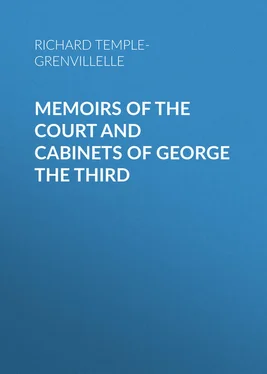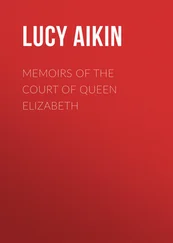Richard Buckingham and Chandos - Memoirs of the Court and Cabinets of George the Third
Здесь есть возможность читать онлайн «Richard Buckingham and Chandos - Memoirs of the Court and Cabinets of George the Third» — ознакомительный отрывок электронной книги совершенно бесплатно, а после прочтения отрывка купить полную версию. В некоторых случаях можно слушать аудио, скачать через торрент в формате fb2 и присутствует краткое содержание. Жанр: foreign_antique, foreign_prose, на английском языке. Описание произведения, (предисловие) а так же отзывы посетителей доступны на портале библиотеки ЛибКат.
- Название:Memoirs of the Court and Cabinets of George the Third
- Автор:
- Жанр:
- Год:неизвестен
- ISBN:нет данных
- Рейтинг книги:5 / 5. Голосов: 1
-
Избранное:Добавить в избранное
- Отзывы:
-
Ваша оценка:
- 100
- 1
- 2
- 3
- 4
- 5
Memoirs of the Court and Cabinets of George the Third: краткое содержание, описание и аннотация
Предлагаем к чтению аннотацию, описание, краткое содержание или предисловие (зависит от того, что написал сам автор книги «Memoirs of the Court and Cabinets of George the Third»). Если вы не нашли необходимую информацию о книге — напишите в комментариях, мы постараемся отыскать её.
Memoirs of the Court and Cabinets of George the Third — читать онлайн ознакомительный отрывок
Ниже представлен текст книги, разбитый по страницам. Система сохранения места последней прочитанной страницы, позволяет с удобством читать онлайн бесплатно книгу «Memoirs of the Court and Cabinets of George the Third», без необходимости каждый раз заново искать на чём Вы остановились. Поставьте закладку, и сможете в любой момент перейти на страницу, на которой закончили чтение.
Интервал:
Закладка:
The accounts of the King still continue to be very favourable, but I have not heard what degree of hope Willis grounds on this long period of tranquillity. I should think that the breaking out in the neck must be a favourable circumstance, but I begin to think the time long if he still continues without real amendment of the complaint itself. This, however, arises more from one's natural impatience than from any reasonable ground which there is to think worse of the case from this circumstance.
One hears of nothing now but of the intended arrangements. Among these, the military is not the least curious part. His Royal Highness the Duke of York is to be Commander-in-chief; Fitzpatrick, Secretary at War; and there are to be four Field-Marshals; consisting of the Regent himself, of the Dukes of York and Gloucester, and General Conway. These Field-Marshals – of whom three never saw a shot fired, and the fourth of whom has not served for six-and-twenty years, except in the very peaceful situation of Commander-in-chief in England for a few months at the end of the war – make a pretty curious promotion. Faucitt is to continue, notwithstanding a positive promise of the Duke of Portland's to General Vaughan, for the sake of securing his vote and his brother's. They are to make all the Colonels Major-Generals, down to Lord Rawdon. The list of the Prince's aides-de-camp you will have seen in the papers.
Lord Spencer is declared for Ireland.
The accounts from Bath say that Fox is better, and will recover.
The town and neighbourhood of Buckingham have voted an unanimous Address to Pitt, without any of us knowing a word about it. It is signed by near two hundred persons, as Jemmy tells me, for I have not seen it.
I am living in hourly fear of having a meeting called in the county, which would be a troublesome and useless thing, though, I understand, the sense of the yeomanry is entirely with us. I hear nothing of their intentions in case of a dissolution, but much doubt, from what I hear, whether they will think of doing more than ousting Aubrey, which they may do very peaceably; for by what I hear, he would not have ten votes.
I have, at length, decided not to think of the Bolton Street house, at least for the present year, as the repairs necessary to make it habitable amount to so large a sum. Perhaps, if I was to be re-elected after a dissolution it might be worth my while; but that is, as you will easily suppose, a very doubtful contingency. Is it not a singular thing that it should be doubtful at all, and that there should be any chance of beating them in the new Parliament on such a question as that?
Ever most affectionately yours,
W. W. G.
I open this letter again, to let you know that I have just received an account of Sir Thomas Halifax's death, which happened this morning. This circumstance is not a little perplexing to me, especially in Bernard's absence. I have sent an express to Chaplin to desire him to come to town to-morrow, and I shall then hear what he says. The thing to be wished is, that we could secure Bernard's election, now and hereafter, without much increase of expense; but on that whole subject I am very much at sea, and there cannot be time to hear from you and him upon it. Perhaps Chaplin may think it better that we should now propose some other person, who might be supported by Lord Chesterfield's interest, and not appear so decidedly connected with us as Bernard is. We had a scheme for a candidate of that sort at the general election, and Lord C. was inclined to give into it. At all events, I think it is absolutely necessary that Bernard should come over instantly, as his presence is equally necessary, either as a candidate or in order to get a repetition of the promises which this intervening election might otherwise be construed to annul.
I have heard, since I wrote the preceding part of this letter, that the Chancellor has been at Pitt's to-day, with an account that he had seen Warren this morning, who had spoken to him in a very favourable manner of the King's present state, and had even said that he thought the amendment so material, that he had felt it his duty, immediately on coming to town, to wait upon His Royal Highness with the account. So there is a little bane for your rats.
Ever yours,
W. W. G.
MR. W. W. GRENVILLE TO THE MARQUIS OF BUCKINGHAM.
Whitehall, Feb. 14th, 1739.
My dear Brother,
Although I have nothing else to write to you, yet I could not refuse myself the pleasure of letting you know that I have been at Kew to-day with Pitt, and that the account which he received from Willis is such as to confirm and strengthen all our hopes. The public account is, as you will see, that the King continues in a state of gradual amendment; and every circumstance which we can learn, affords us room to entertain the most sanguine hopes. What has already passed in the public, on the subject of Willis, and the violent attacks of Opposition against him, have made him more cautious and reserved in what he says, and he particularly desires that his name may not be quoted. But I could not find in my heart to conceal from you the favourable manner in which he speaks of the present situation.
His account is confirmed by that of the other physicians, who all speak the same language. Sir G. Baker told him to-day, that if it was the case of a common patient whom he was attending, he should not think it necessary to give him any more medicines. The most favourable circumstance of all is, the great abatement of the pulse, which, till now, has always been much too high.
You will easily imagine how much speculation all this makes, and a more curious scene, I think, I never saw. The prevailing opinion is, that we are not to be turned out. There is a report, which is very confidently circulated (but I do not vouch for the truth of it), that the Duke of Portland has positively told His Royal Highness that, under these circumstances, it is impossible for him to take any share in a new arrangement. It is also said that they have quarrelled about the Prince's debts, but these are points of which I know nothing but from report.
The account which Lord Chesterfield had yesterday from his friends at Aylesbury tallies with Chaplin's, as to the possibility of Bernard's success, though it is not quite so sanguine as to numbers. If he succeeds at all, this last point may be no misfortune to him, as it will diminish the claims upon him.
Ever most affectionately yours,
W. W. G.
The Irish Parliament had met in the interim, and were debating with extraordinary vigour and asperity the Address by which the Prince of Wales, before he had been appointed Regent in England, was to be invited to assume at once the functions and privileges of the Crown in Ireland. Many of the usual supporters of the Government, including even some persons in high employments, had joined the ranks of the Opposition; and Lord Buckingham in his letters to Lord Sydney declares that his powers had been annihilated by that lapse of the sovereign authority which led to this result, and that it would be no longer proper for him to interfere any further, except only in reference to the "usual business of the kingdom." Acting on the pressure of these circumstances, he felt it due to his own credit, and to the service in which he was engaged, to tender his resignation, as appears by the following letter from Mr. Grenville:
MR. W. W. GRENVILLE TO THE MARQUIS OF BUCKINGHAM.
Whitehall, Feb. 13th, 1789.
My dear Brother,
We have no news here, except of the favourable accounts of the King's situation, which are every hour more and more confirmed. All our present anxiety is, to keep down the too sanguine expectations of our friends, in order to prevent their being too much damped by any check, which Willis considers as an event by no means unlikely, and not such as in any degree to diminish his confidence in the King's recovery. From the general turn of people's conversation here, it seems by no means certain that the Prince will take any step for dismissing the present Government, if the King continues to mend. It would, indeed, be a measure so grossly indecent to turn out the King's servants at the eve of his recovery, that it would be too strong even for those counsels by which His Royal Highness has hitherto been actuated. But there is another consideration which will possibly have still more weight, namely, that the acceptance of office under such circumstances would put his friends to considerable inconvenience and expense, such as to be by no means worth incurring, if they are to hold them for so very short a period as the King's present situation appears to indicate. This mode of reasoning is of itself sufficiently obvious, and I understand that the Prince has held a language which corresponds with it, since so great an alteration has taken place.
Читать дальшеИнтервал:
Закладка:
Похожие книги на «Memoirs of the Court and Cabinets of George the Third»
Представляем Вашему вниманию похожие книги на «Memoirs of the Court and Cabinets of George the Third» списком для выбора. Мы отобрали схожую по названию и смыслу литературу в надежде предоставить читателям больше вариантов отыскать новые, интересные, ещё непрочитанные произведения.
Обсуждение, отзывы о книге «Memoirs of the Court and Cabinets of George the Third» и просто собственные мнения читателей. Оставьте ваши комментарии, напишите, что Вы думаете о произведении, его смысле или главных героях. Укажите что конкретно понравилось, а что нет, и почему Вы так считаете.












